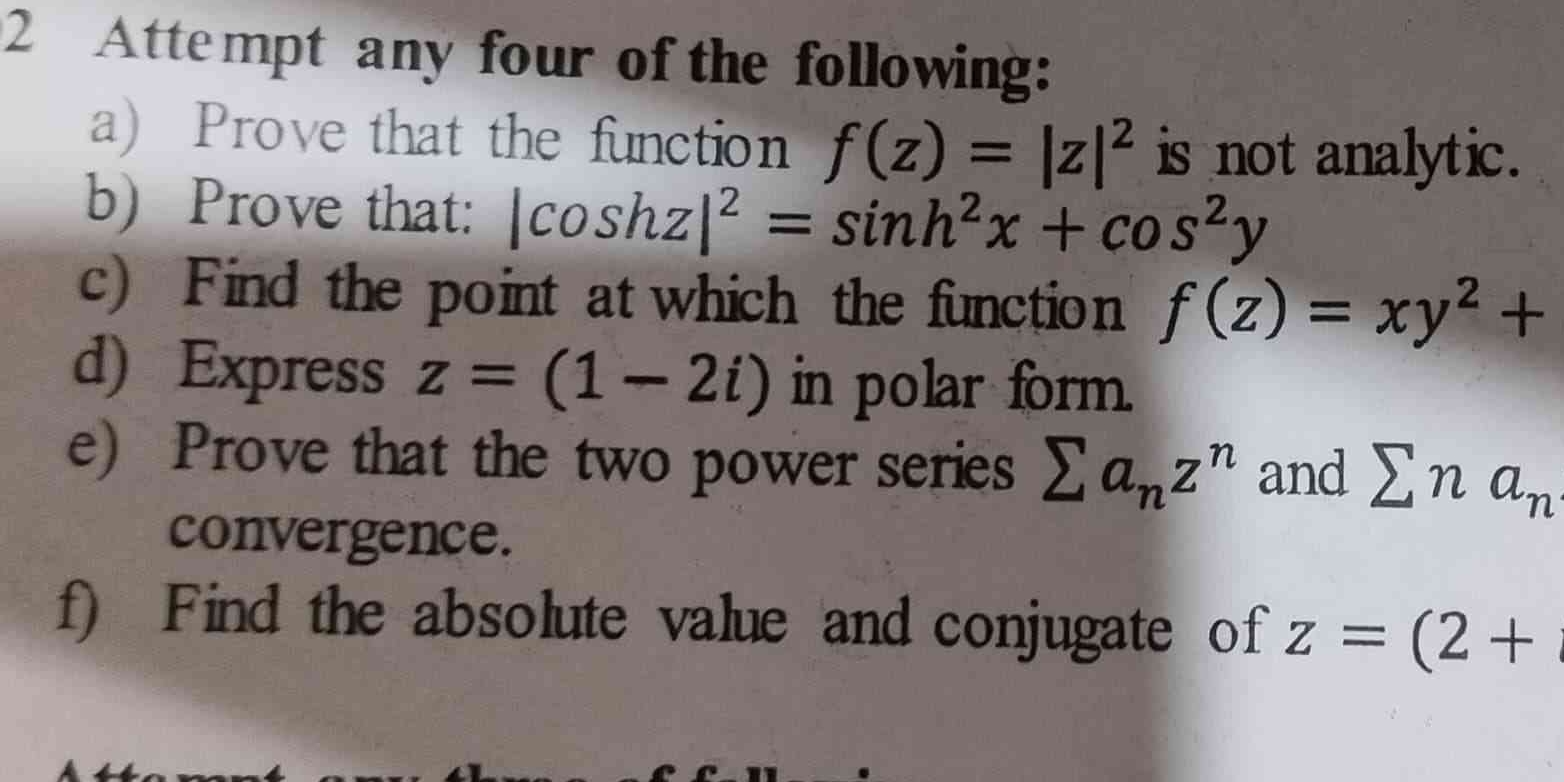Attempt any four of the following: a) Prove that the function f(z) = |z|^2 is not analytic. b) Prove that: |cosh z|^2 = sinh^2 x + cos^2 y. c) Find the point at which the function... Attempt any four of the following: a) Prove that the function f(z) = |z|^2 is not analytic. b) Prove that: |cosh z|^2 = sinh^2 x + cos^2 y. c) Find the point at which the function f(z) = xy^2 + ... is located. d) Express z = (1 - 2i) in polar form. e) Prove that the two power series Σ a_n z^n and Σ n a_n converge. f) Find the absolute value and conjugate of z = (2 + ...).

Understand the Problem
The question presents a set of mathematical problems related to complex functions and series. It requires proving properties of functions and expressing complex numbers in different forms.
Answer
1. Not analytic 2. $|\cosh z|^2 = \sinh^2 x + \cos^2 y$ 3. $z = \sqrt{5}(\cos \theta + i \sin \theta)$ 4. $|2 + 3i| = \sqrt{13}$, $\overline{2 + 3i} = 2 - 3i$
Answer for screen readers
- $f(z) = |z|^2$ is not analytic.
- $|\cosh z|^2 = \sinh^2 x + \cos^2 y$.
- $z = 1 - 2i$ in polar form is $\sqrt{5}(\cos \theta + i \sin \theta)$ where $\theta = \tan^{-1}(-2)$.
- $|2 + 3i| = \sqrt{13}$ and $\overline{2 + 3i} = 2 - 3i$.
Steps to Solve
- Prove that $f(z) = |z|^2$ is not analytic
A function $f(z)$ is analytic at a point if it satisfies the Cauchy-Riemann equations. The function $f(z) = |z|^2$ can be expressed as $f(z) = x^2 + y^2$, where $z = x + iy$.
To check if it is analytic, we compute the partial derivatives:
- $u(x, y) = x^2 + y^2$
- $v(x, y) = 0$
The Cauchy-Riemann equations are: $$ \frac{\partial u}{\partial x} = \frac{\partial v}{\partial y} $$ $$ \frac{\partial u}{\partial y} = -\frac{\partial v}{\partial x} $$
Calculating the derivatives: $$ \frac{\partial u}{\partial x} = 2x $$ $$ \frac{\partial u}{\partial y} = 2y $$ $$ \frac{\partial v}{\partial x} = 0 $$ $$ \frac{\partial v}{\partial y} = 0 $$
Now we check the equations:
- $2x \neq 0$ unless $x = 0$ (fails C-R equation)
- $2y = 0$ only if $y = 0$ (also fails C-R equation)
Thus, the function $f(z)$ is not analytic.
- Proving $|\cosh z|^2 = \sinh^2 x + \cos^2 y$
Recall the definitions of hyperbolic functions: $$ \cosh z = \cosh(x + iy) = \cosh x \cos y + i \sinh x \sin y $$
Calculating the modulus squared: $$ |\cosh z|^2 = (\cosh x \cos y)^2 + (\sinh x \sin y)^2 $$
Expanding and rearranging: $$ = \cosh^2 x \cos^2 y + \sinh^2 x \sin^2 y $$
Using the identity $\cos^2 y + \sin^2 y = 1$, we factor out: $$ = \sinh^2 x + \cos^2 y $$
- Express $z = 1 - 2i$ in polar form
To express a complex number in polar form, we calculate the modulus and argument.
-
Modulus: $$ r = |z| = \sqrt{(1)^2 + (-2)^2} = \sqrt{1 + 4} = \sqrt{5} $$
-
Argument: $$ \theta = \tan^{-1}\left(\frac{-2}{1}\right) $$
The polar form is given by: $$ z = r(\cos \theta + i \sin \theta) $$
Thus, $$ z = \sqrt{5}\left(\cos\left(\tan^{-1}\left(-2\right)\right) + i \sin\left(\tan^{-1}\left(-2\right)\right)\right) $$
- Finding absolute value and conjugate of $z = 2 + 3i$
The absolute value of a complex number $z = x + yi$ is given by: $$ |z| = \sqrt{x^2 + y^2} $$
Calculating: $$ |2 + 3i| = \sqrt{2^2 + 3^2} = \sqrt{4 + 9} = \sqrt{13} $$
The conjugate of $z = x + yi$ is given by: $$ \overline{z} = x - yi $$
Therefore: $$ \overline{2 + 3i} = 2 - 3i $$
- $f(z) = |z|^2$ is not analytic.
- $|\cosh z|^2 = \sinh^2 x + \cos^2 y$.
- $z = 1 - 2i$ in polar form is $\sqrt{5}(\cos \theta + i \sin \theta)$ where $\theta = \tan^{-1}(-2)$.
- $|2 + 3i| = \sqrt{13}$ and $\overline{2 + 3i} = 2 - 3i$.
More Information
The Cauchy-Riemann equations are crucial for determining the analyticity of complex functions. Polar forms are essential in simplifying complex calculations and visualizing complex numbers in the plane.
Tips
- Misapplying C-R equations: Sometimes, students neglect to check both conditions of the Cauchy-Riemann equations.
- Polar conversion errors: Errors can occur if the argument is not correctly derived, particularly with respect to the quadrant of the angle.
- Forget absolute value and conjugate definitions: Mixing up definitions can lead to errors when calculating properties of complex numbers.
AI-generated content may contain errors. Please verify critical information